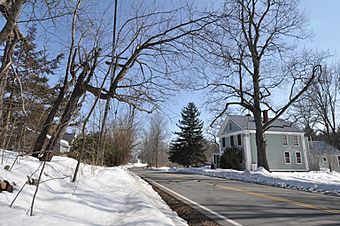Smith's Corner Historic District facts for kids
Quick facts for kids |
|
|
Smith's Corner Historic District
|
|

NH 107A at Smith's Corner
|
|
| Location | Main Ave., South, Stagecoach, and Chase Rds., South Hampton, New Hampshire |
|---|---|
| Area | 105.5 acres (42.7 ha) |
| Architect | Multiple |
| Architectural style | Mixed (more Than 2 Styles From Different Periods) |
| MPS | South Hampton MRA |
| NRHP reference No. | 83001149 |
| Added to NRHP | April 11, 1983 |
The Smith's Corner Historic District is a special area in South Hampton, New Hampshire. It's like a time capsule, showing what a small village looked like in the 1800s. This district covers about 105.5 acres. It's located where Main Avenue, South Road, and Chase Road meet. This spot was once a very important stop for stagecoaches! Because of its history, it was added to the National Register of Historic Places in 1983.
Discovering Smith's Corner Historic District
Smith's Corner is found in the northwest part of South Hampton. This is a quiet, rural area in southeastern New Hampshire. The main road here, New Hampshire Route 107A, was once a busy stagecoach route. It connected towns like Amesbury, Massachusetts and Newburyport, Massachusetts to Kingston, New Hampshire.
A Busy Stagecoach Stop
For a long time, this part of South Hampton was mostly farmland. But in the 1800s, when the stagecoach route opened, everything changed. Smith's Corner became a vital service stop for travelers. Imagine horse-drawn stagecoaches stopping here!
Many taverns, which were like inns or hotels, opened up. Travelers could rest, eat, and change horses. The Smith House, located near Main Avenue and Stagecoach Lane, is one of these old taverns that you can still see today. Another building, the George Goodwin House, also had a license to be a tavern. Other buildings around the crossroads helped support the stagecoach business.
Old Buildings and Their Stories
Today, all the buildings in the Smith's Corner Historic District are used as homes or for farming. The district is home to some of South Hampton's oldest houses. One example is the Moses Eaton House on Stagecoach Road, built around 1750. It's a great example of an old New England farmstead.
You can also find several other houses from the 1700s. These often show the "Georgian" style of architecture. The most important buildings, built in the mid-1800s for the stagecoach trade, are in the "Greek Revival" style. These buildings tell the story of a busy time when stagecoaches ruled the roads!
 | May Edward Chinn |
 | Rebecca Cole |
 | Alexa Canady |
 | Dorothy Lavinia Brown |



